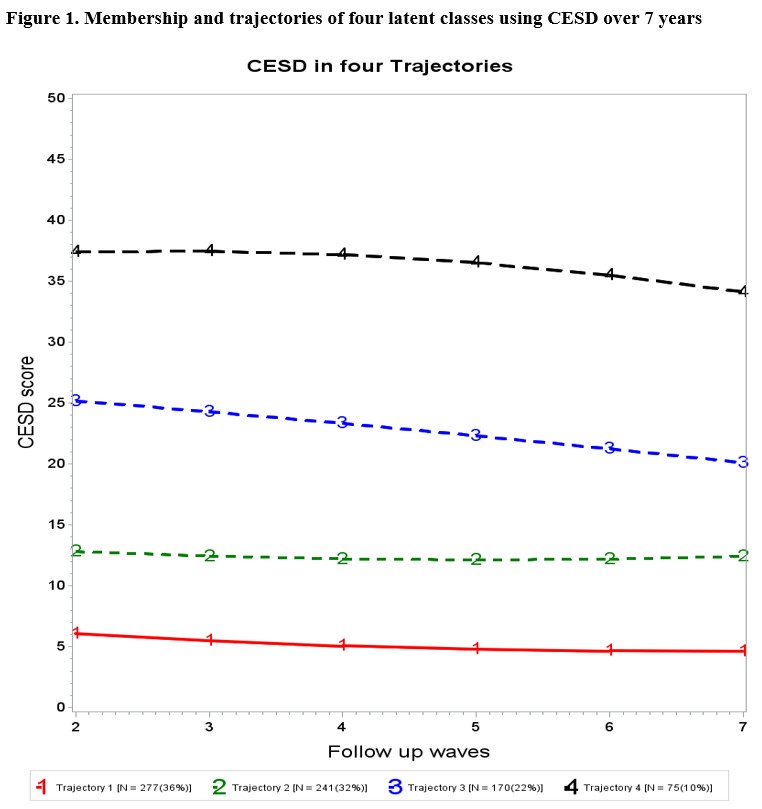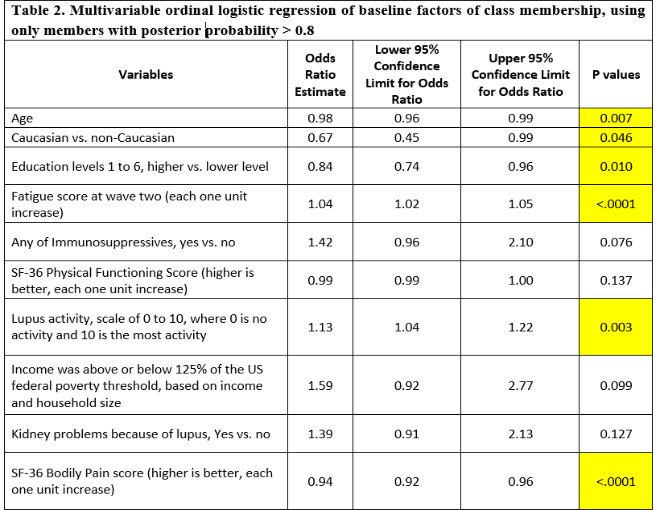Session Information
Date: Sunday, November 7, 2021
Title: SLE – Diagnosis, Manifestations, & Outcomes Poster II: Manifestations (0855–0896)
Session Type: Poster Session B
Session Time: 8:30AM-10:30AM
Background/Purpose: Depression remains one of the most frequently observed psychiatric disorders in patients with SLE with a pooled prevalence of 35.0% (95% CI: 29.9%-40.3%). Nevertheless, the trajectory of depression in this population remains uncharacterized. Our aims were to: 1) determine longitudinal trajectories of depressive symptoms in patients with SLE, 2) identify baseline factors that predict a patient’s trajectory of depression.
Methods: Longitudinal data on 763 adults with SLE followed over 7 years from a single center were analyzed. Depressive symptoms were assessed with the Centre for Epidemiologic Studies Depression Scale (CESD) annually in years 2-7 providing 6 waves of observation (wave 2 is the baseline assessment for CESD). Patients with two or more waves of data for CESD were included. Group-based joint trajectory modelling was used to model latent classes. Using only members with latent class posterior probability > 0.8, univariable and multivariable analyses were used to examine baseline factors association with latent classes memberships. The outcomes were the ordinal worse classes of depression represented by latent classes. The assumption of proportionality of the model was checked and satisfied between the four latent classes.
Results: Depressive symptoms were mapped into four trajectories: 1) lowest CESD scores (no depression, 36%), 2) low CESD scores (no depression, 32%), 3) high CESD scores (depression, 22%), and 4) highest CESD scores (depression, 10%). Figure 1 shows the longitudinal trajectories of four latent classes based on their CESD values over 7 years.
Table 1 shows the baseline demographic information in four classes of patients after they were grouped into four trajectories.
Data on 584 (76%) patients satisfied the posterior probability 0.8 and were analyzed in the ordinal logistic regression. In the multivariable analyses, older age at baseline, Caucasian, higher education level and less SF-36 Bodily Pain were associated with better CESD classes while higher fatigue score and SLE disease activity by SLAQ were associated with worse CESD classes (Table 2).
Conclusion: Four distinct trajectories for depressive symptoms were found. Baseline factors that were associated with latent classes were identified that may be helpful in identifying individuals with SLE who are at the greatest risk of developing persistent depressive symptoms over time. These results will serve as a more comprehensive guide for prognosis and clinical decisions to improve overall treatment outcomes.
To cite this abstract in AMA style:
Chawla S, Su J, Touma Z, Katz P. Trajectories of Depressive Symptoms in Systemic Lupus Erythematosus over 7 Years [abstract]. Arthritis Rheumatol. 2021; 73 (suppl 9). https://acrabstracts.org/abstract/trajectories-of-depressive-symptoms-in-systemic-lupus-erythematosus-over-7-years/. Accessed .« Back to ACR Convergence 2021
ACR Meeting Abstracts - https://acrabstracts.org/abstract/trajectories-of-depressive-symptoms-in-systemic-lupus-erythematosus-over-7-years/



